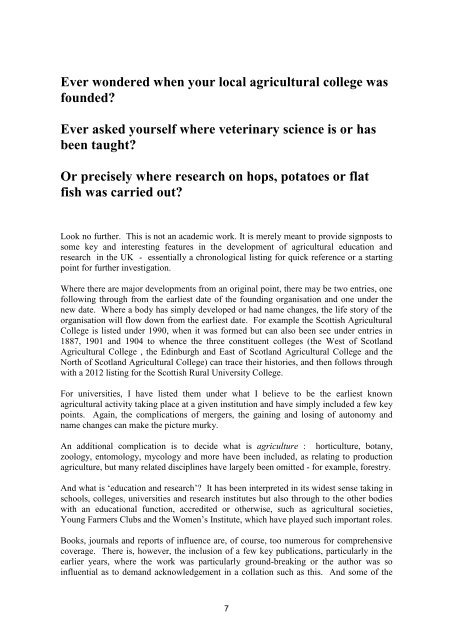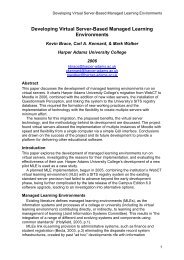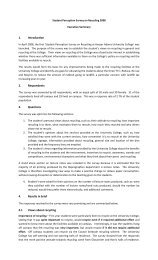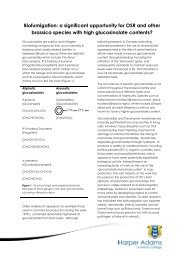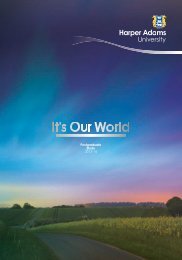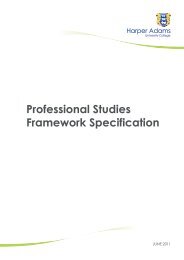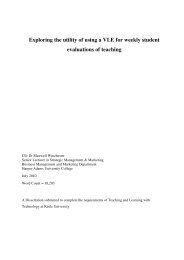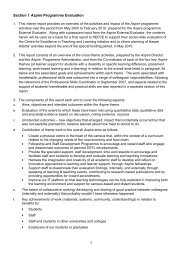a short history of agricultural education and research
a short history of agricultural education and research
a short history of agricultural education and research
You also want an ePaper? Increase the reach of your titles
YUMPU automatically turns print PDFs into web optimized ePapers that Google loves.
Ever wondered when your local <strong>agricultural</strong> college wasfounded?Ever asked yourself where veterinary science is or hasbeen taught?Or precisely where <strong>research</strong> on hops, potatoes or flatfish was carried out?Look no further. This is not an academic work. It is merely meant to provide signposts tosome key <strong>and</strong> interesting features in the development <strong>of</strong> <strong>agricultural</strong> <strong>education</strong> <strong>and</strong><strong>research</strong> in the UK - essentially a chronological listing for quick reference or a startingpoint for further investigation.Where there are major developments from an original point, there may be two entries, onefollowing through from the earliest date <strong>of</strong> the founding organisation <strong>and</strong> one under thenew date. Where a body has simply developed or had name changes, the life story <strong>of</strong> theorganisation will flow down from the earliest date. For example the Scottish AgriculturalCollege is listed under 1990, when it was formed but can also been see under entries in1887, 1901 <strong>and</strong> 1904 to whence the three constituent colleges (the West <strong>of</strong> Scotl<strong>and</strong>Agricultural College , the Edinburgh <strong>and</strong> East <strong>of</strong> Scotl<strong>and</strong> Agricultural College <strong>and</strong> theNorth <strong>of</strong> Scotl<strong>and</strong> Agricultural College) can trace their histories, <strong>and</strong> then follows throughwith a 2012 listing for the Scottish Rural University College.For universities, I have listed them under what I believe to be the earliest known<strong>agricultural</strong> activity taking place at a given institution <strong>and</strong> have simply included a few keypoints. Again, the complications <strong>of</strong> mergers, the gaining <strong>and</strong> losing <strong>of</strong> autonomy <strong>and</strong>name changes can make the picture murky.An additional complication is to decide what is agriculture : horticulture, botany,zoology, entomology, mycology <strong>and</strong> more have been included, as relating to productionagriculture, but many related disciplines have largely been omitted - for example, forestry.And what is ‘<strong>education</strong> <strong>and</strong> <strong>research</strong>’? It has been interpreted in its widest sense taking inschools, colleges, universities <strong>and</strong> <strong>research</strong> institutes but also through to the other bodieswith an <strong>education</strong>al function, accredited or otherwise, such as <strong>agricultural</strong> societies,Young Farmers Clubs <strong>and</strong> the Women’s Institute, which have played such important roles.Books, journals <strong>and</strong> reports <strong>of</strong> influence are, <strong>of</strong> course, too numerous for comprehensivecoverage. There is, however, the inclusion <strong>of</strong> a few key publications, particularly in theearlier years, where the work was particularly ground-breaking or the author was soinfluential as to dem<strong>and</strong> acknowledgement in a collation such as this. And some <strong>of</strong> the7


